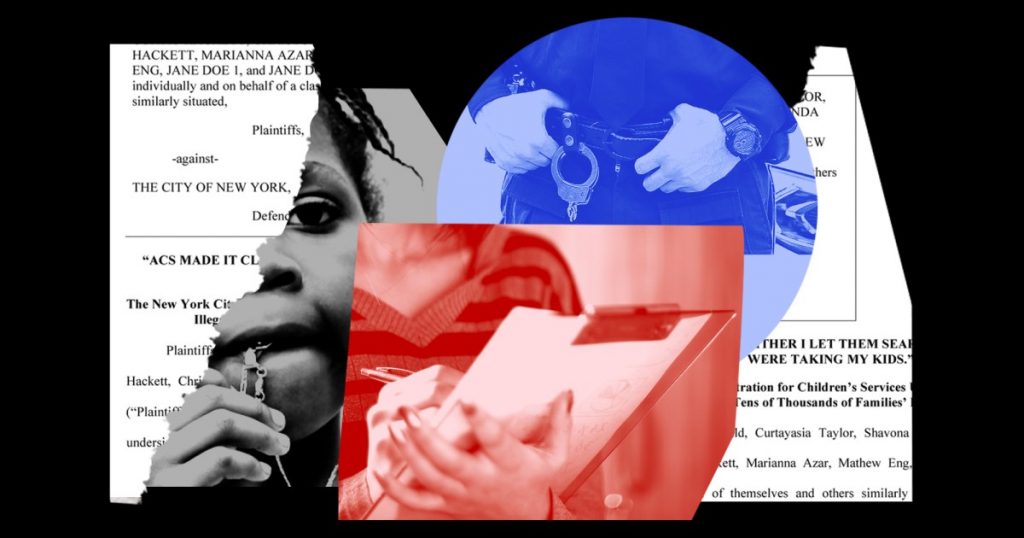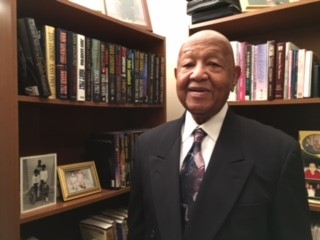Parents Are Suing New York City Over Coercive, Traumatizing Home Searches
Mother Jones illustration; Getty; Bailey Torres/Unsplash
Fight disinformation: Sign up for the free Mother Jones Daily newsletter and follow the news that matters.In May 2021, investigators from New York City’s child protective services agency showed up at the home of Ebony Gould, a Black mother living in Queens. They were checking on the wellbeing of Gould’s three children—ages 4, 6, and 16—and needed to search the home.
The investigation proved to be unfounded. No children were removed, no court case filed. But soon, the investigators were back for another search, and then another. Over the next two years, the Goulds were subject to at least a dozen investigations by the city’s Administration for Children’s Services (ACS), all of which proved to be baseless, according to a recent lawsuit. Though the caseworkers didn’t have warrants for the home searches, they allegedly told Gould the inspections were mandatory, threatening to remove her children if Gould didn’t allow them in. Once inside, investigators searched every room and even went so far as to strip-search the children, who showed no signs of physical abuse.
Gould is among a group of parents who brought a class-action lawsuit against the city Tuesday, alleging that the agency uses unconstitutional, coercive, and traumatizing tactics to enter and search the homes of families they’re investigating, more than 80 percent of whom are Black or Hispanic. The tactics included threatening to remove children or bring in law enforcement, telling parents they have no choice but to allow the searches, failing to inform parents of their rights, and banging on doors and otherwise making a scene outside. Investigators conduct untrammeled searches in tens of thousands of homes each year, the suit alleges, rifling through medicine cabinets, drawers, fridges, and closets, regardless of whether these private spaces have a connection to the allegations made about the family.
There are three ways investigators can legally justify a home search: a court order, an emergency situation, or voluntary consent. But the vast majority of searches fell outside these legal justifications, the suit alleges, violating the Fourth Amendment’s protection against unreasonable search and seizure. Court orders were sought in just 222 of the nearly 53,000 searches ACS conducted last year. Emergency situations served as the basis to remove children in less than 2 percent of investigations.
Parents are left humiliated and “unable to protect their children in their own homes,” says David Shalleck-Klein, executive director of the Family Justice Law Center, the organization representing the plaintiffs. He noted that ACS should be able to search families’ homes—but only when they follow legal procedures.
ACS spokesperson Marisa Kaufman said the agency is “committed to keeping children safe and respecting parents’ rights,” adding that they are working to “reduce the number of families experiencing an unnecessary child protective investigation.” ACS is expanding a pilot program that informs parents of their rights during such investigations.
Of the thousands of investigations ACS opens each year, less than 7 percent result in a case in family court, and a fraction of those are for cases of physical or sexual abuse. Critics say the system casts too wide of a net, resulting in a family surveillance system that harms those it’s tasked with protecting. “Coerced home searches, invasion of families’ privacy, and threatening parents with child removal are integral aspects of a system designed to disrupt the most marginalized communities in America,” Dorothy Roberts, a legal scholar who has spent decades studying child protective services, told Mother Jones.
In New York City, as in other parts of the country, half of Black children are subjected to a child protective services investigation by the time they turn 18. The indicators of poverty overlap with the indicators of neglect, putting poor families at greater risk. The system also allows abusive ex-partners to weaponize the hotline by making false reports. (This was what happened to Gould, according to the suit.)
The intrusive practices laid out in the lawsuit have been well documented for years. According to a 2020 audit commissioned by ACS, staff said that they are incentivized to “be invasive and not tell parents their rights.” The investigations, which routinely last 60 days and involve multiple visits, are akin to “being stopped and frisked for sixty days,” said one ACS staffer. And New York City isn’t alone: A 2022 investigation by ProPublica and NBC News found that CPS agencies across the country said they only sought court orders for home searches when denied entry by parents.
The plaintiffs are asking a judge to declare ACS’s practices unconstitutional. If successful, the suit could transform the way one of the nation’s largest child welfare systems conducts investigations—and serve as a model for those pushing back against warrantless searches elsewhere. “Curbing CPS investigations is a critical step,” Roberts says, “toward the radical change needed in this nation’s approach to child welfare from policing families to supporting them.”





